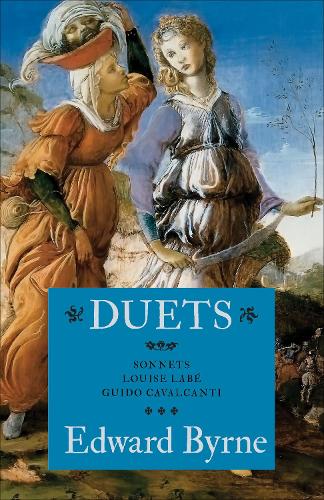
Duets: Sonnets : Louise Lab : Guido Cavalcanti
(Paperback)
Publishing Details
Duets: Sonnets : Louise Lab : Guido Cavalcanti
By (Author) Edward Byrne
Talon Books,Canada
Talon Books,Canada
14th June 2018
Canada
Classifications
Physical Properties
Paperback
112
Width 139mm, Height 215mm, Spine 7mm
159g
Description
In the case of Louise Lab, the twenty-four sonnets (one in Italian, twenty-three in French) constitute a narrative sequence chronicling the entire duration of an intense love relation. In Guido's case, the sonnets are not sequential, but Byrne has selected out what he believes to be the most directly philosophical of his sonnets, those which, as has been argued, demonstrate his "radical aristotelianism" (averroism). In both cases, one pre-Petrarchan, one post-Petrarchan, love is represented as both a wildness, madness or malady, and as something that gives rise to speculation regarding the relation between body and intellect. I refer to these poems as translations, rather than versions, because the depth of my engagement with them convinces me that they remain subservient to their sources this can only be tested by reading them against their originals. A reader not compelled to do so, can read them as their poems. In doing so, they will find ninety poems, each made up of nine lines, each line, in turn, made up of nine syllables (with minor exceptions only Allah is perfect). The main body of the work was written in the manner of the serial poem, a practice whereby the composing mind passes from room to room (stanza to stanza) in a kind of trance of forgetting and remembering. A distant, but undeniable precursor of this practice, in the context of translation, is Robin Blaser's les chimres. The second version of Louise Lab's sonnet sequence was translated from Rilke's German translation, using Louise's middle French text as a "pony" (crib or gloss necessary because the author's German ain't so great). interspersed, or intervening, within the translations, are "sonnets" by Michel Foucault, Julia Kristeva, Marcel Proust, and Jacques Lacan. In addition, between the main translations there is a sequence of wild sonnets, or nonets, taken from a separate collaboration with Kim Minkus (to be published in The Capilano Review), and a pendant of sonnets by Louise's admirers (members of her salon, such as Maurice Scve and Clment Marot).
Reviews
"That such a gem is Ted Byrnes creation is hardly surprising."The Capilano Review
Author Bio
Edward Byrne was born in Hamilton Ontario, and moved to Vancouver in the late sixties. His earlier writing appeared in publications like Canadian Forum and Fiddlehead. He earned Masters in Comparative Literature at UBC where he still teaches one class each term in the Humanities 101 Program. Byrne was the Director of the Trade Union Research Bureau for many years. He was also a board member of the Kootenay School of Writing for ten years. Currently he is a member and Treasurer of the Lacan Salon and a member of the Meschonnic Study Group. He is working on various writing projects, including: a sequel to his novel Beautiful Lies; a book of short poems.
